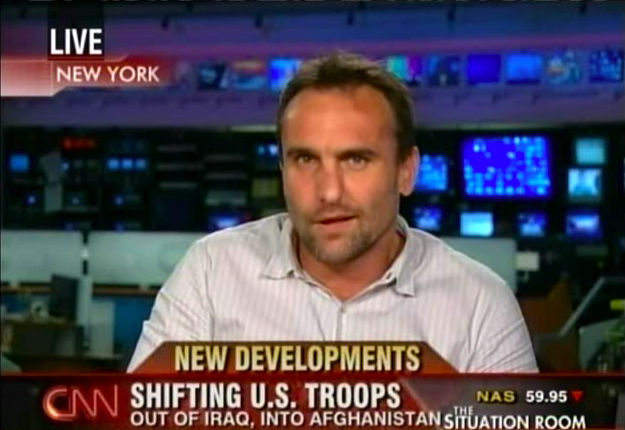TSR: "You're still going to have the same or even more number of U.S. boots on Iraqi soil as you did pre-surge."

Length: 5:04
LARGE (59.0 MB) ----- SMALL (6.1 MB)
Michael spells out what today's announced withdrawals really add up to and again has to go through the explanation of why the Iraqi government isn't embracing the "Sons of Iraq."
WOLF BLITZER: Let's get some more now on the shifting U.S. troops, what's going on. We'll bring in Michael Ware. He's been on the ground for most of this time, since the war, back in 2003.
Michael, what's the impact? This year no more troops are coming out of Iraq. But January and February, they're going to remove about 8,000 or so troops from the 145,000 who are there right now.
What's the bottom line impact of this troop withdrawal?
MICHAEL WARE, CNN CORRESPONDENT: Symbolically, okay, it makes a statement. Practically, Wolf, to be honest, it means nothing. Even when you take out that extra combat brigade, which is due mid-January to February next year, that will make a total of 8,000 troops from now until then. You're still going to have the same or even more number of U.S. boots on Iraqi soil as you did pre-surge.
But what's changed is the nature of the battle. Essentially, America has put on the government payroll the bulk of the Sunni insurgency and some of the elements of al Qaeda.
Meanwhile, it's put the bulk of the pro-Iranian militias and their political wings into government.
So what we're seeing is that, yes, a phenomenal downturn in violence by any of the metrics used by the military -- between 40 and 80 percent -- violence has plummeted.
BLITZER: Well, Michael, let me ask you...
WARE: Deaths are down. Who doesn't welcome that, Wolf?
BLITZER: Let me interrupt you. It's one thing to say that former Sunni insurgents in the al-Anbar Province, for example, maybe 100,000 or so, are on the U.S. government payroll -- about $300 per man right now. But when you say that former al Qaeda terrorists are on the U.S. government payroll right now, is there hard evidence that we -- American taxpayers -- are paying al Qaeda terrorists to be quiet and stay on the sidelines?
WARE: Well, you're not paying them to be quiet and stay on the sidelines. You know, you've brought them over to the other side. And now correct me if I'm wrong -- and I stand here to be corrected -- but I remember a statement from President Bush himself that those who were fighting with al Qaeda against us are now fighting against al Qaeda with us.
And regardless, Wolf, you know, I've crossed that line. I've been to al Qaeda training camps. I've seen how they work. I've been to their safe houses. I know individuals -- not just foot soldiers, not just mid-ranking commanders, but emirs who are now on the U.S. government payroll.
And why is that a bad thing? Because the Sunni insurgents in Iraq were driven to al Qaeda by American policies. The Sunni insurgency was created because America wasn't talking to them. Right from the beginning, in 2003, the hierarchy of the Sunni insurgency said to me, why are we on opposite sides here? We were allies in the '80s. We have nothing against America. And, finally, the deal was cut. And now you see the downturn in violence. It's not a difficult calculation -- Wolf.
BLITZER: Michael Ware, what I don't understand and a lot of other people don't understand, put them on the payroll of somebody, but put them on the Iraqi government's payroll. They have billions and billions of dollars in surplus.
WARE: Forget about it.
BLITZER: Why do the U.S. taxpayers still have to pay these people?
WARE: Forget about it. Forget about it. They're not working for the Iraqi government, Wolf. They're America's insurance policy. The Iraqi government hates these guys. They resent their existence. They are essentially a U.S. militia that not only went out and assassinated al Qaeda -- because they knew where al Qaeda slept and they're not bound by the rules of war like the U.S. Army. But also, they are a counterbalance for America and America's Sunni allies -- like Saudi Arabia, Jordan, Egypt -- against the Iranian-backed militia.
So essentially, the Sunni Awakening Councils, these former insurgents, former al Qaeda, are your insurance policy. You take that away, you give that to the Iraqis -- look what's happening. Already the U.S. military is trying to hand these fellows over to the Iraqi government. And already, the Iraqi government has started killing them and putting out arrest warrants for them.
So there's no love lost between either side. I've been with these U.S. militia. And they say we've dealt with al Qaeda, the next enemy is this Iranian-backed government.
So now the real test for the next president is how do they manage this situation and keep a lid on the conflict.
BLITZER: Michael Ware with his analysis of what's going on.
Michael, thank you.
WARE: Thanks, mate.
